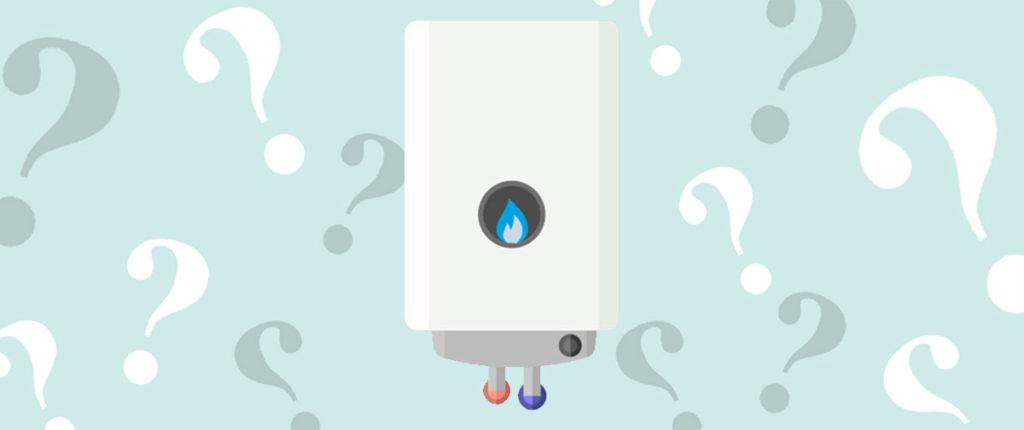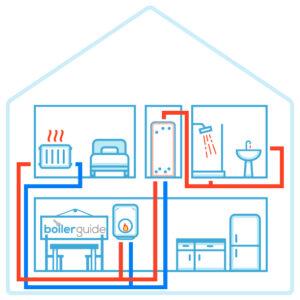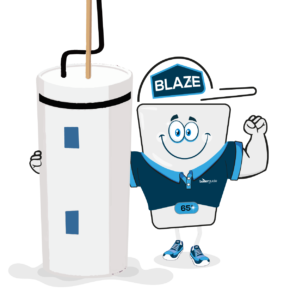What is a System Boiler? Pros, Cons & Costs

Need a boiler that can meet high demands for hot water? A system boiler could be the perfect option for you.
In this guide, we'll take you through the pros, cons and costs of system boilers. If you have questions, like ‘will a system boiler fit in my house’ or ‘how much do they cost?’, we have the answers you need.
Are you just looking for the exact costs of a new system boiler? The most accurate way to find out is by getting quotes from multiple heating engineers. This way, you can compare the quotes and see what the best price in your area is. But how do you find quotes from qualified heating engineers near you?
Boiler Guide can help provide you with up to 3 free, no-commitment quotes from qualified heating engineers in your area, enabling you to choose the best deal and get the most value for your money.
Click the button below to get your free quotes now and have your new system boiler installed as soon as possible.
Get your best deal
Quickly compare 3 FREE quotes
- Quotes from local engineers
- Get quotes today, installed tomorrow
- Finance options available
- Save up to £500 on installation
- Quotes from local engineers
- Get quotes today, installed tomorrow
- Finance options available
- Save up to £500 on installation

1,8 million quotes provided in 10 years
See more reviews:
What is a system boiler? System boilers explained
A system boiler directly heats your central heating and produces hot water for an unvented storage cylinder.
They work like a regular (conventional) boiler, in that they need to store hot water, but differ in the way they take in their water supply.
These boilers are more compact than a regular boiler, but still able to deliver a high volume of domestic hot water.

How does a system boiler work?
A system boiler uses a heat exchanger to provide hot water for your house. This heat exchanger transfers energy from burning fuels. With electric system boilers, the water is heated using an electrical element.
The majority of the components required for generating heating and hot water are built into a system boiler. The only external part required is an unvented cylinder that stores the hot water.
By taking their water supply directly from the mains, system boilers eliminate the need for a tank of water in the loft (which would be needed with a regular boiler). They then heat the water to warm up the central heating as well as hot water for the cylinder.
You can find out more about how different types of boilers work in our Boiler Types Explained article.
System boiler prices
 Prices of system boilers in the UK can vary greatly depending on the manufacturer and model. Looking at the potential cost of all gas system boilers available, prices can range from £500 right up to around £2,000.
Prices of system boilers in the UK can vary greatly depending on the manufacturer and model. Looking at the potential cost of all gas system boilers available, prices can range from £500 right up to around £2,000.
Of the best system boilers we recommend, models manufactured by Baxi and Worcester Bosch are, on average, available at the lowest price. Prices for the Baxi 800 and Worcester Bosch Greenstar i range both begin at around £900. Meanwhile, the most expensive of these system boilers are in the Vitodens 200-W range, manufactured by Viessmann, with prices averaging £1,500.
The system boiler prices in table below only cover the cost of the unit itself and not the installation. If you need a hot water storage cylinder either installing or replacing then that will add to the costs too.
| System Boiler Model | Average Price (excluding installation) |
|---|---|
| Baxi 800 | £900 – £1,000 |
| Ideal Vogue Max | £1,000 – £1,250 |
| Vaillant ecoTEC Plus | £1,000 – £1,250 |
| Viessmann Vitodens 200-W | £1,250 – £1,500 |
| Worcester Bosch Greenstar i | £900 – £1,100 |
Installation costs
In addition to the system boiler prices, you will also need to remember the installation costs. Many things can have an impact on this, including:
- Complexity of the installation
- Accessibility
- Rates charged by the installer
- Where you live (boiler installations tend to be more expensive in London, for example)
On average, the installation of a new system boiler will cost between £800 – £1,500. In the table below, we reveal the potential cost of the best system boilers including the installation.
| Boiler Model | Average Price (excluding installation) | Approximate cost of boiler fully installed |
|---|---|---|
| Baxi 800 | £900 – £1,000 | £1,400 – £2,000 |
| Ideal Vogue Max | £1,000 – £1,250 | £1,500 – £2,250 |
| Vaillant ecoTEC Plus | £1,000 – £1,250 | £1,500 – £2,250 |
| Viessmann Vitodens 200-W | £1,250 – £1,500 | £1,750 – £2,500 |
| Worcester Bosch Greenstar i | £900 – £1,100 | £1,400 – £2,100 |
Depending on the complexity of the installation, a system boiler can take anywhere between 1 and 3 days. The quickest and most straightforward type of system boiler installation is a like-for-like replacement. The installation will take longer when it's replacing a different type of heating system. For example, replacing a combi with a system boiler would involve re-routing the pipework and installing a hot water cylinder. Installation time will also increase if you're planning to move the boiler to a new location.
As already mentioned, the prices in the tables above are estimated costs of a new system boiler installation. The only way to find out accurate prices is by getting quotes from heating engineers in your area. Researching and contacting heating engineers one by one can take up hours of your time. But don’t worry – we can help speed up this process for you.
We can connect you with up to 3 qualified heating engineers from our network. You’ll receive free, no-commitment quotes from each of them, which you can then compare to choose the best one. This way, you’ll save money as well as time.
Click the button below to get your free quotes and have your system boiler installed by a professional.
Get your best deal
Quickly compare 3 FREE quotes
- Quotes from local engineers
- Get quotes today, installed tomorrow
- Finance options available
- Save up to £500 on installation
- Quotes from local engineers
- Get quotes today, installed tomorrow
- Finance options available
- Save up to £500 on installation

1,8 million quotes provided in 10 years
See more reviews:
Is a system boiler right for your home?

The boiler type best suited to your home is essentially down to the size of your property and the level of demand for heating and hot water. In terms of space, combi boilers require the least while regular boilers need the most. System boilers sit in the middle of this scale as an unvented hot water storage cylinder is essential, but they don't need any additional tanks.
If you live in a small home or flat, it's unlikely that you'll have room for a cylinder, which would make a combi boiler more suitable. Smaller properties are also unlikely to need a system boiler as the hot water demands will be lower.
Advantages of a system boiler
By taking on the best bits of combi and regular boilers, it's no surprise that installing a system boiler comes with a number of benefits:
-
Easier installation
Installation of a system boiler can be easier, quicker and neater than that of a regular boiler. This is due to many of the individual components of the heating and hot water system being built into a system boiler.
-
Great for high hot water demand
The storage of hot water in a cylinder means you can use multiple taps simultaneously without a reduction in pressure. This makes it ideal for busy or large households with more than one bathroom.
-
Fast and economical
System boilers include a pump, which means it responds quickly and has more economic running costs.
-
Compatible with solar thermal
If generating hot water with solar is high on your agenda then a system boiler is worth considering. The unvented hot water storage cylinder can be altered to heat water using solar power.
Disadvantages of a system boiler
While there are plenty of benefits to installing a system boiler, it's worth noting the potential downsides too. Here are a few considerations to make before having a system boiler installed:
-
System boilers can take up more space
Although there is no need for a cold water feed tank, system boilers actually take up more space than combi boilers. This is due to the need for a hot water storage cylinder. This is one of the few downsides of system boilers vs combi boilers.
-
Hot water cylinder size
The amount of hot water you can use will be dictated by the size of your cylinder. Once the cylinder is empty, you will need to wait for more water to be heated. We tested that this process can take between 20 and 30 minutes depending on the model.
-
Hot water isn't instant
As the hot water is stored in a storage cylinder that can only hold so much water, it can run out when lots of hot water is used. The system boiler will then have to heat more water and fill the cylinder before your home has hot water again.
If after weighing up the pros and cons, you’ve decided that a system boiler is right for you, the next step will be finding a heating engineer to help you install one. When looking for a heating engineer, it can be difficult to know whether or not their rates are fair or overpriced. This is where Boiler Guide can help you.
We have a network of qualified heating engineers across the UK. We can send you quotes from up to 3 trusted heating engineers in your area. This way, you can easily compare their rates and choose the best deal, giving you peace of mind that you’re not overpaying.
Our service is completely free and you’re under no obligation to accept any of the offers you receive. Click the button below to start comparing your free quotes now.
Get your best deal
Quickly compare 3 FREE quotes
- Quotes from local engineers
- Get quotes today, installed tomorrow
- Finance options available
- Save up to £500 on installation
- Quotes from local engineers
- Get quotes today, installed tomorrow
- Finance options available
- Save up to £500 on installation

1,8 million quotes provided in 10 years
See more reviews:
Comparing boilers: Things to consider
Finding the best and most suitable system boiler for your home involves taking the time to compare different models. To do this, you'll need to know what to look for and compare different system boilers with each other. Only then you can be sure that you are choosing the system boiler that best fits your home.
Things to consider when selecting a system boiler
There are a couple of things you should look out for when selecting a system boiler. The following factors are the most important to take into consideration:
-
Output rating
This is the power of the boiler and is measured in kilowatts (kW). System boilers have a central heating output rating which gives an idea of how many radiators the unit will be capable of heating up.
-
Efficiency
Boilers convert fuel into usable energy and how much of the fuel ends up being converted is reflected in the efficiency rating. Effectively, the higher the efficiency rating, the less energy is wasted when it is in use.
-
Warranty
All boilers come with a warranty which will see that you're covered by the manufacturer should it develop an issue after the installation. What the warranty covers and how long for will vary from boiler to boiler.
-
Potential cost
System boiler prices range from around £500 to £2,000 (without the cylinder and before installation). Depending on how much you're looking to spend there are many options to suit all budgets.
-
Heating controls
Having greater control of your heating will allow you to keep energy usage to a minimum. Many modern boilers can now be controlled from a smartphone or tablet.
-
Heating engineer reviews
When it comes to boilers, heating engineers are the experts. Reading their reviews and getting opinions from fully-qualified heating engineers will give you valuable insight into the system boiler you're considering.
-
Customer reviews
You want to be confident that your new system boiler will be reliably heating your home for many years to come. Taking the time to read through reviews left by homeowners who have already installed a certain boiler will let you know if they've had any problems over the years.
What size system boiler do you need?
 The size of the boiler is one of the most important factors to consider. By size, we don't mean the physical dimensions of the boiler, we mean the power the unit is able to put out. This is known as the output rating and is measured in kilowatts (kW).
The size of the boiler is one of the most important factors to consider. By size, we don't mean the physical dimensions of the boiler, we mean the power the unit is able to put out. This is known as the output rating and is measured in kilowatts (kW).
The higher the output rating, the more powerful the boiler. Having said this, it isn't a good idea to simply install the system boiler with the highest output rating. An output rating that's too high for your home could cause your energy bills to rise and if it's too low, it will struggle to meet demand.
You can work out the most suitable output rating for your home by counting up the number of radiators and bathrooms. Using this information, you can get an idea of the level of demand for central heating and domestic hot water.
The recommended output ratings in the table below are intended as a guide. To get a more accurate idea, you should get a quote from a Gas Safe registered engineer. Many manufacturers also list advice on their own websites, so if you have a brand in mind you should also check their guidance.
| Bathrooms | Radiators | Recommended Output |
|---|---|---|
| 1 | 10 | 9-15 kW |
| 2-3 | 15 | 18-26 kW |
| 3+ | 20 | 27-40 kW |
A system boiler with an output rating of 28-34 kW will meet the heating demands of a home with 20 radiators and 2-3 bathrooms.
If you live in a smaller property with one bathroom and little space to spare for a cylinder, a combi boiler would be a more suitable heating system. You can find the perfect output rating for your home in our guide: What Size Boiler Do I Need?
In addition to the size of the system boiler, the cylinder will need to have sufficient capacity to meet the hot water demands of your home.
What hot water cylinder do you need?
Before deciding on a manufacturer and model, there are some important considerations to make when installing a hot water cylinder:
- Vented or unvented
- Direct or indirect
- Capacity
Vented or unvented?
Vented cylinders are traditionally installed with regular boilers as water is delivered to these via a cold water tank in the loft. Due to the absence of these tanks in system boiler setups, an unvented cylinder should be used instead.
Unvented cylinders take their water supply directly from the mains, which allows for stronger flow rates and a much lower risk of water contamination.
Direct or indirect?
The water within an indirect cylinder is heated by a boiler or solar thermal technology. Whereas, the water in direct cylinders is heated by an electric immersion heater (so there is no boiler involved). This means that you’ll need an indirect cylinder if you wish to install a system boiler.
Capacity
Typically measured in litres, the capacity of hot water cylinders vary from model to model. So if you live in a large home with multiple bathrooms, and have a high demand for hot water, then a cylinder with a large capacity would make the most sense.
As a guide, the table below shows the cylinder capacity (litres) you should consider depending on the number of bathrooms in your property.
| Bathrooms | Cylinder Capacity (litres) |
|---|---|
| 1 | 120 – 150 |
| 1 | 180 |
| 2 | 210 |
| 2 | 250 – 300 |
| 2+ | 300+ |
You should check that your new system boiler is compatible with the unvented cylinder that you're considering. Additionally, if you're planning to invest in solar thermal in the future then the cylinder must be solar compatible.
Finding the best system boiler installer
A new system boiler is a big investment so you'll want the installation to be carried out to the highest standard by a competent installer. A gas-fired system boiler must be installed by a Gas Safe registered engineer (an OFTEC technician is needed for the installation of oil boilers).
Rather than accepting the first quote you receive, we highly recommend comparing at least 3 quotes from different companies. Taking the time to compare quotes will help you to find the most competent installer offering the most competitive price.
Complete our simple online form today and you'll get free boiler quotes for the installation of a new system boiler from up to 3 heating companies based in your area. After completing the form, each company we match you with will give you a call to arrange a date and time to quote for the boiler installation.
Click the button below to get started.
Get your best deal
Quickly compare 3 FREE quotes
- Quotes from local engineers
- Get quotes today, installed tomorrow
- Finance options available
- Save up to £500 on installation
- Quotes from local engineers
- Get quotes today, installed tomorrow
- Finance options available
- Save up to £500 on installation

1,8 million quotes provided in 10 years
See more reviews:
FAQ
What is the difference between a system boiler and combi boiler?
System and combi boilers share the ability to heat your home in an efficient manner. But the biggest difference between the two boiler types is that a combi boiler doesn't require a hot water cylinder.
How much does a system boiler cost?
The cost of a system boiler can vary strongly depending on the boiler manufacturer and the installer. The average system boiler costs between £900-£1,250. Including installation costs, this can reach up to £2,250.
Are system boilers efficient?
System boilers are generally considered to be efficient heating systems. This is because they heat water on demand and don't have to store hot water in a separate tank. Besides this, system boilers often feature a condensing technology which also makes them highly efficient.
Is a system boiler the same as a conventional boiler?
No, a system boiler and a conventional boiler are not the same. A system boiler is a type of central heating boiler that requires a separate hot water storage cylinder, while a conventional boiler (also known as a regular, traditional or heat-only boiler) is designed to work with a separate hot water tank and cold-water storage tank. Regular boilers are often used in older heating systems, while system boilers are more common in modern installations.




